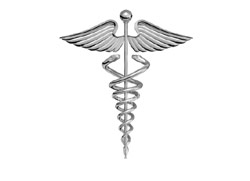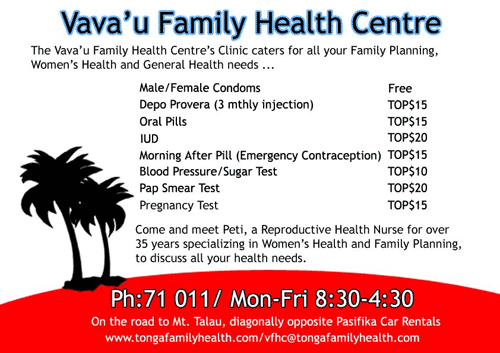|
|
Your most up to date online guide to Tonga since 2004. Vava'u: 18°41' 60 S 174°1' 60 W |
|

Custom Search
|
|
Visitor Facts for visiting in Vava'u Islands, Tonga
Sailing | Diving | Fishing | Whales | Bird Watching | Kayaking | Water Tours | Land Tours | Surfing | Kitesurfing | Booking Agents | Arts and Crafts | Booking Agents | Vehicle Rentals | Horseback Riding | Internet | Tongan Feasts | Kava Parties | Churches | Laundry & Ice | Buy Tongan Made
What to bring : Medical
Enjoy your stay in beautiful Tonga, remember to bring along the basics... remember to slip (on a shirt), slop (on a hat) and slap (on some sunscreen)
cap or hat sunscreen/lip balm sunglasses - UV reef shoes mosi repellant simple medicines - antibacterial/panadol/ etc a light jacket or sweatshirt for the evenings (yes we are in the tropics but we have trade winds and it can make some people feel the chill...) a sarong Drybag Food cooler bag Medical Information
Cuts and scratches
As in all Tropical countries with humidity any scratch can become easily infected. I have lived here for years and still get infections by not following these simple rules... but I am a guy!
However the risk can be minimised quickly and easily by disinfecting the cut immediately, especially coral cuts, with betadine or other similar products and then applying a topical antibacterial such as Bactroban and then covering with a guase and band aids. Open wounds must always be covered as flies in most tropical countries (Australia, Samoa, PNG, Solomon's, Guam, Caribbean, Fiji, Vanuatu, American Samoa) carry staph.
Poisonous and Dangerous animals
Water
Sea Snakes
As in all tropical waters, sea snakes may be seen around coral reefs. Unprovoked, sea snakes are extremely unlikely to attack and their fangs will not penetrate a wet suit. First-aid treatment consists of compression bandaging and splinting of the affected limb. Antivenin is effective, but may have to be flown in. Only about 10% of sea snake bites cause serious poisoning.Poisonous cone shells
Abound along shallow coral reefs. Stings mainly cause local reactions but nausea, faintness, palpitations or difficulty in breathing are signs flagging the need for medical attention. It is best to leave all shells in the sea - they are the habitats of sea creatures; do not steal their homes!Stonefish/Lion Fish
Fish Poisoning
Ciguatera is a form of poisoning that affects otherwise safe and edible fish unpredictably. Poisoning is characterised by stomach upsets, itching, faintness, slow pulse and bizarre inverted sensations, eg cold feeling hot and vice versa. Ciguatera has been reported in many carnivorous reef fish, especially barracuda but also red snapper, Spanish mackerel and moray eels. There is no safe test to determine whether a fish is poisonous or not. Although local knowledge is not entirely reliable, it is reasonable to eat what the locals are eating. However, fish caught after times of reef destruction, eg after a major hurricane, are more likely to be poisonous. Treatment consists of rehydration and if the pulse is very slow, medication may be needed. Healthy adults will make a complete recovery, although disturbed sensation may persist for some weeks.Jellyfish
Blue-coloured Indo-Pacific 'Man o' War' is found in all waters. If you see these floating in the water or stranded on the beach it is wiser not to go in. The sting is very painful. Treatment involves ice packs and vinegar; do not use alcohol. Smaller cubo-medusae are abundant and are found particularly on still, overcast days. They usually produce only uncomfortably irritating stings but can cause generalised symptoms (although this is rare), especially in someone with poorly controlled heart disease.Land
Dogs
There are a lot of dogs roaming around Tonga. Most are either friendly or will keep their distance, but a few (especially when they're in packs) are aggressive. Pretending to throw a stone often discourages them.Molikau
- small to large, brown centipede, bites.
Scolopendra subspini~es (Scolopendridael)
Not to be confused with the harmless millipede.Heat Exhaustion
The region lies within the tropics so it is hot and frequently humid. Heat exhaustion is actually a state of dehydration associated to a greater or lesser extent with salt loss. Natural heat loss is through sweating, making it easy to become dehydrated without realising it. Thirst is a late sign. Small children and old people are especially vulnerable. For adults, heat exhaustion is prevented by drinking at least 3L of water per day and more if actively exercising. Children need about 1½L to 2½L per day. Salt replacement solutions are useful since muscle weakness and cramps are due to salt as well as water loss and can be made worse by drinking water alone. The powders used for treating dehydration due to diarrhoea are just as effective when it is due to heat exhaustion. Apart from commercial solutions, a reasonable drink consists of a good pinch of salt to a pint (½L) of water. Salt tablets can result in too much salt being taken in, causing headaches and confusion.Australians
(yes the owner of this website is a Kiwi, and he will never forget the "underarm bowling incident").Heatstroke
When the cooling effect of sweating fails, heat stroke ensues. This is a dangerous and emergency condition characterised not only by muscle weakness and exhaustion, but by mental confusion. Skin will be hot and dry. If this occurs 'put the fire out' by cooling the body with water on the outside and if possible with cold drinks for the inside. Seek medical help as a follow-up anyway, but urgently if the person can't drink.We have a public hospital which is fairly well supplied (Prince Ngu Hospital phone 70 201), a professional pharmacy for medical assistance (phone 70213 see below), for diving and water related emergencies contact VHF 16 and follow emergency procedures for Mayday or Pan Pan so the most appropriate help can be dispatched - we have a number of highly qualified rescue and medical volunteers that will be contacted
HEALTH
Vavau Pharmacy & Health Centre ltd
Neiafu
(676) 70 213
email pharmacy@kalianetvav.to
Pharmacy & Health Centre Hours
Monday, Tuesday, Thursday, Friday
8.30am to 4pm
Saturday
8.30am to 11.30amPhysiotherapy Services (by appointment only) Treatment for:
· Soft-tissue Injuries
· Back and Neck Pain
· Sports Injuries
· Massage
· Pain and Stress Relief
Sailing | Diving | Fishing | Whales | Bird Watching | Kayaking | Water Tours | Land Tours | Surfing | Kitesurfing | Booking Agents | Arts and Crafts | Booking Agents | Vehicle Rentals | Horseback Riding | Internet | Tongan Feasts | Kava Parties | Churches | Laundry & Ice | Buy Tongan Made


